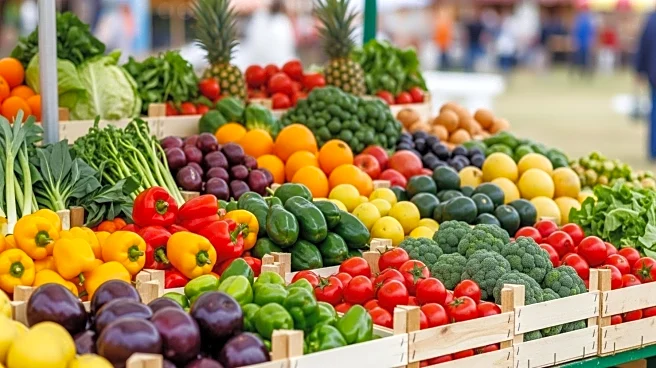What is the story about?
What's Happening?
A recent study by the International Association of Fairs and Expositions has revealed the significant economic impact of fairs and fairgrounds across the Rocky Mountain Region. The study found that fairgrounds generated $4.9 billion in economic activity, attracting 219.8 million visitors and sustaining 39,200 jobs. The findings underscore the importance of agriculture and related events in promoting economic growth and cultural heritage. Fairs serve as a platform to showcase agricultural products and the Western way of life, contributing to local economies through tourism, job creation, and tax revenues.
Why It's Important?
The study highlights the vital role of agriculture in regional economies, emphasizing the need for continued support and promotion of agricultural events. Fairs not only boost economic activity but also foster community engagement and cultural preservation. The findings demonstrate the potential of agriculture to drive economic development, providing opportunities for local businesses and enhancing the visibility of agricultural practices. As agriculture faces challenges such as misinformation and changing consumer preferences, events like fairs play a crucial role in educating the public and promoting sustainable practices.
What's Next?
The study's results may encourage policymakers and stakeholders to invest in agricultural events and infrastructure, recognizing their economic and cultural value. Efforts to promote agriculture through education and community engagement are likely to continue, with initiatives such as Wyoming Agriculture in the Classroom playing a key role. The focus on showcasing agriculture may lead to increased support for farmers and ranchers, helping to address challenges and ensure the sustainability of agricultural practices. Collaboration between industry groups and educational institutions could further enhance the impact of agricultural events.
Beyond the Headlines
The emphasis on agriculture and fairgrounds highlights broader societal trends, including the growing interest in local food systems and sustainable practices. The study's findings may influence public perceptions of agriculture, encouraging greater appreciation for the contributions of farmers and ranchers. The cultural significance of fairs and agricultural events reflects the enduring connection between communities and their agricultural heritage, fostering a sense of identity and pride. As agriculture evolves, the role of events in promoting innovation and adaptation will be increasingly important.
















